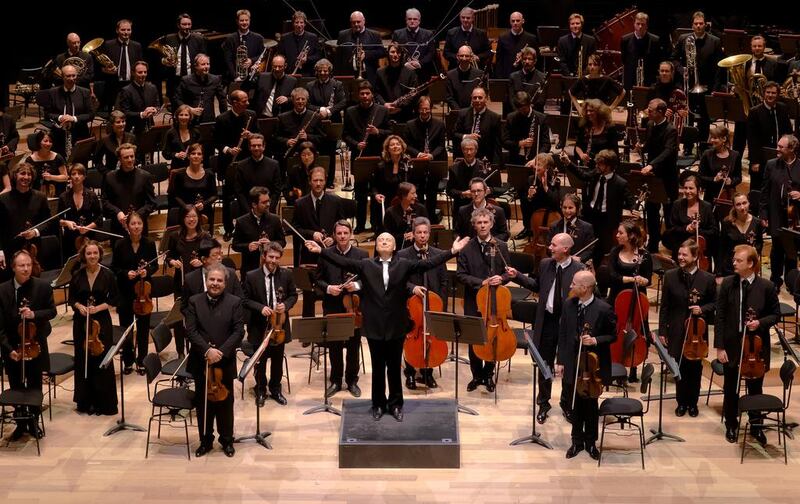The Abu Dhabi Festival’s music programme reaches a crescendo with a pair of performances from Orchestre de Paris – one of Europe’s most celebrated symphony ensembles – at Emirates Palace. Holding the baton will be Paavo Järvi, one of the world’s most prolific conductors, who this summer will step down after a historic six years as the orchestra’s musical director.
The 53-year-old will make his UAE debut tomorrow, leading the musicians through an all-French programme, featuring soloists Xavier Phillips, performing Lalo's Cello Concerto, and Thierry Escaich performing Saint-Saëns's Organ Symphony.
However, it is Sunday's second programme that will allow the Estonian conductor's personality to shine through, with a rare performance of Jean Sibelius's Symphony No. 2, alongside a reading of Tchaikovsky's classic Violin Concerto, featuring the young Armenian soloist Sergey Khachatryan.
The two programmes you are bringing to Abu Dhabi are very different.
The first is related to the orchestra’s traditions and the second to my tradition. I come from Estonia, a very Nordic country close to Finland. Our languages are almost the same, so I bring [Finnish composer] Sibelius’s second symphony – which in my opinion is one of the great masterpieces of the 20th century.
It is a welcome surprise.
In general, Sibelius is slightly underestimated for practical reasons. Somewhere in the first part of the 20th century, the German music establishment was searching where to go next – there were very strong forces leading music into the new 12-tone area, which was a logical continuation of the Germanic line. And then, there were people who didn’t follow that – Rachmaninoff, Sibelius and others tried to find their own path and, as a result, alienated the critics and influential voices of that time. They dismissed it as old-fashioned, not innovative enough, too romantic.
Does music have a duty to innovate? Is being aesthetic not enough?
New music, good new music – all art for that matter – has to bring something new to the table. But that doesn’t necessarily mean you have to disregard the past, or disconnect from the listener. One of the problems with so-called new music in the first half of the 20th century is that it reacted to the reality of world war. The world was going through enormous turmoil – destruction, death and despair – so a lot of the music of that time reflects the austerity, rigidness, coldness and emotional detachment. It was quite deliberate – there was too much tragedy and turmoil around, and there is a certain refuge in trying to look at music as a kind of mathematical puzzle where everything needs to fit together – but what they forgot is that the primary reason for music to exist is to communicate something. It is not enough to just be intellectually interesting, it also has to have the right dosage of emotional accessibility. Very few people will go to a concert for a rigorous mental exercise. A really great piece is written so that people won’t even notice the architecture of it.
Do you think the music of the 20th century has any less artistic merit than that of the 18th or 19th?
No – if we consider the 20th century as a whole, it’s a tremendous time in music. If you look at the beginning, with Mahler, Debussy and Ravel, all the Russians, Shostakovich and Prokofiev, and if you look at Bernstein and Gershwin – one can put together an enormously impressive list – it’s just more eclectic. There is no shortage of really exceptional composers – it’s just not as unified because the musical borders were open and less defined.
You mention Bernstein – you studied with him in Los Angeles.
It was one of the greatest experiences of my life. If we talk about really great personalities and human beings, he was one of them. It was at the height of his fame, he was somebody revered and treated like a living saint. I think of him often because the things he said were so valid, and somehow became a credo for me – I live by certain moments and certain things that he told me.
What makes the Orchestre de Paris so special?
This is an orchestra with a soul. Every orchestra has its own personality, and one of the things that I love about Orchestre de Paris is their sensitivity, their appreciation of nuance. It’s not only technical precision, a high musical level, but they enjoy a certain subtlety that’s not easy to achieve with, say, an American orchestra.
• The Orchestre de Paris perform as part of the Abu Dhabi Festival at Emirates Palace tomorrow and on Sunday at 8pm each night. Tickets prices start at Dh125. Visit www.abudhabifestival.ae for more information.
rgarratt@thenational.ae





